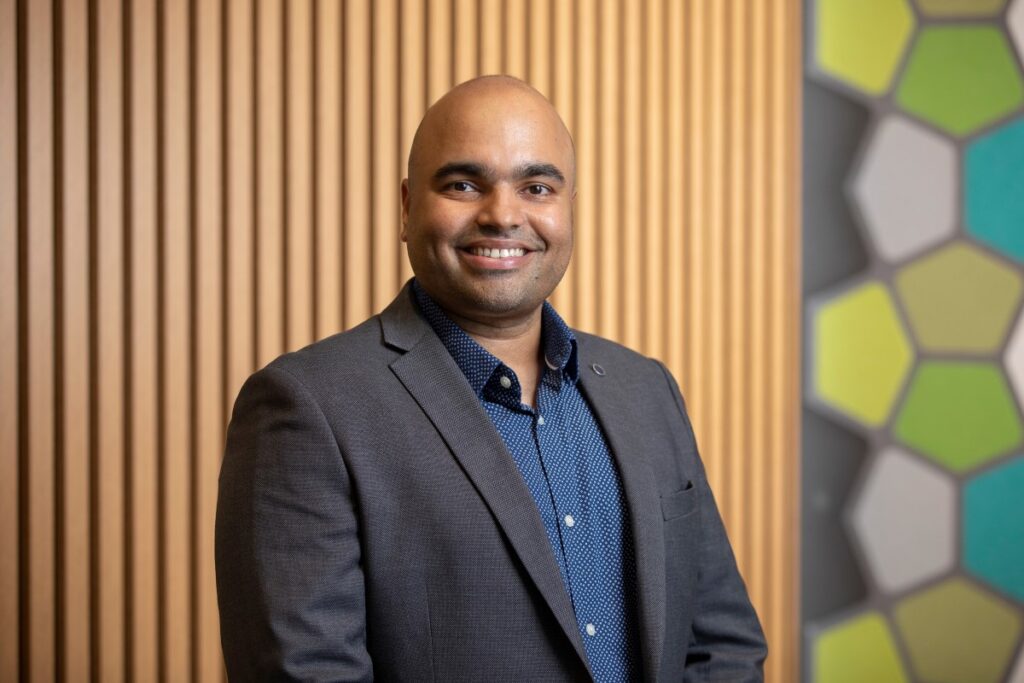Replacing ‘blunt-edged’ chemotherapy with targeted treatment
Important new research sets out to find new treatments that could be more effective at killing leukaemia cells with fewer side effects.
Acute myeloid leukaemia (AML) is a type of blood cancer that affects the blood and bone marrow. When someone has AML, their body makes a dangerous amount of immature white blood cells that can’t do their usual job of fighting infection.
It’s estimated 1,331 Australians will be diagnosed with AML in 2023, and sadly the disease has low long-term survival rates. Only about one in four people with AML survive five years after their diagnosis.
To save more lives from AML, we urgently need to look past standard chemotherapy toward new, more effective approaches to treatment. Supported by Tour de Cure, one of our inaugural Breakthrough Fellowship recipients, Dr Ashwin Unnikrishnan, is doing just that.
Beyond chemotherapy
Dr Unnikrishnan’s research aims to provide new treatment options for people diagnosed with AML where standard treatment is not effective.
“The standard treatment for AML is chemotherapy, a blunt-edged tool that kills cells indiscriminately whilst being ineffective at eliminating leukaemic cells from the body,” explains Dr Unnikrishnan.
“Our proposal aims to improve this, by discovering more specific and effective ways to kill leukaemic cells.”
His research aims to develop better treatments for AML by targeting RNA slicing, a molecular pathway that Dr Unnikrishnan’s lab has discovered is frequently altered in people with AML.
“I aim to establish a new paradigm for treating leukaemia, by targeting cancer-specific vulnerabilities in leukaemic cells created by RNA alterations,” says Dr Unnikrishnan.
Simply put, these new treatment options will be able to target leukaemic cells specifically.
“These treatments could be more effective and with fewer side effects, as healthy cells would be spared,” added Dr Unnikrishnan.
Investing in the best
The new funding will help further develop Dr Unnikrishnan into a world leader in leukaemia research.
“With this fellowship, I aim to build upon my emerging international reputation in leukaemia research to establish a globally leading research program leveraging fundamental discoveries in RNA biology, to develop more effective treatments and improve our understanding of leukaemia aetiology,” says Dr Unnikrishnan.
His research project, Skipping beyond chemotherapy: Therapeutically targeting aberrant RNA splicing in Acute Myeloid Leukaemia, will be conducted over five years at the University of New South Wales.
The Leukaemia Foundation is grateful to our inaugural Breakthrough Fellowship partner, Tour de Cure, for their generous funding of Dr Unnikrishnan’s life-saving work.
About Dr Ashwin Unnikrishnan
Dr Ashwin Unnikrishnan is a renowned cancer researcher with a track record of impactful translational biology research in blood cancers. He has a strong focus on myelodysplastic syndrome (MDS) and acute myeloid leukaemia.
He is the Head of the Molecular Mechanisms in the Leukaemia laboratory at the Lowy Cancer Research Centre at the University of New South Wales, leading a team of senior postdoctoral scientists, PhD students, and research staff.
Dr Unnikrishnan’s core research goal is to improve the understanding of factors that reduce the effectiveness of frontline therapy for leukaemia and to use this evidence to develop more effective treatment options. His groundbreaking research also received funding from the Leukaemia Foundation in 2013.
About our Breakthrough Fellowships
The Leukaemia Foundation Breakthrough Fellowships, supported by Tour de Cure, are the flagship funding initiative of our National Research Program.
This new prestigious program represents our unwavering commitment to investing in the next generation of our country’s brightest researchers and clinicians. By investing in the best, we’ll deliver improved outcomes for Australians with blood cancer and save more lives.
Just like the Leukaemia Foundation, our Breakthrough Fellowship recipients are taking bold steps as leaders in Australia’s blood cancer ecosystem. They are established researchers who have made significant contributions to the way we treat and care for people living with blood cancer. These fellowships ensure talented change-makers are taking the next steps in their careers to help transform the lives of people facing blood cancer.
